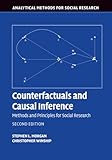Counterfactuals and causal inference : methods and principles for social research / Stephen L. Morgan, Christopher Winship.
Material type: TextSeries: Analytical methods for social researchPublisher: New York, NY : C.U.P., 2015Edition: 2nd edDescription: 499 p. : illISBN: 9781107694163 (pbk)Subject(s): Social sciences -- Research | Social sciences -- Methodology | CausationOnline resources: Cover image Summary: "In this second edition of Counterfactuals and Causal Inference, completely revised and expanded, the essential features of the counterfactual approach to observational data analysis are presented with examples from the social, demographic, and health sciences. Alternative estimation techniques are first introduced using both the potential outcome model and causal graphs; after which, conditioning techniques, such as matching and regression, are presented from a potential outcomes perspective. For research scenarios in which important determinants of causal exposure are unobserved, alternative techniques, such as instrumental variable estimators, longitudinal methods, and estimation via causal mechanisms, are then presented. The importance of causal effect heterogeneity is stressed throughout the book, and the need for deep causal explanation via mechanisms is discussed"-- Provided by publisher.
TextSeries: Analytical methods for social researchPublisher: New York, NY : C.U.P., 2015Edition: 2nd edDescription: 499 p. : illISBN: 9781107694163 (pbk)Subject(s): Social sciences -- Research | Social sciences -- Methodology | CausationOnline resources: Cover image Summary: "In this second edition of Counterfactuals and Causal Inference, completely revised and expanded, the essential features of the counterfactual approach to observational data analysis are presented with examples from the social, demographic, and health sciences. Alternative estimation techniques are first introduced using both the potential outcome model and causal graphs; after which, conditioning techniques, such as matching and regression, are presented from a potential outcomes perspective. For research scenarios in which important determinants of causal exposure are unobserved, alternative techniques, such as instrumental variable estimators, longitudinal methods, and estimation via causal mechanisms, are then presented. The importance of causal effect heterogeneity is stressed throughout the book, and the need for deep causal explanation via mechanisms is discussed"-- Provided by publisher.
| Item type | Current library | Call number | Status | Date due | Barcode |
|---|---|---|---|---|---|
 Books
Books
|
Main Library Open shelves collection | H 62 MOR (Browse shelf (Opens below)) | Available | BK0037675 |
Includes bibliographies
"In this second edition of Counterfactuals and Causal Inference, completely revised and expanded, the essential features of the counterfactual approach to observational data analysis are presented with examples from the social, demographic, and health sciences. Alternative estimation techniques are first introduced using both the potential outcome model and causal graphs; after which, conditioning techniques, such as matching and regression, are presented from a potential outcomes perspective. For research scenarios in which important determinants of causal exposure are unobserved, alternative techniques, such as instrumental variable estimators, longitudinal methods, and estimation via causal mechanisms, are then presented. The importance of causal effect heterogeneity is stressed throughout the book, and the need for deep causal explanation via mechanisms is discussed"-- Provided by publisher.

There are no comments on this title.